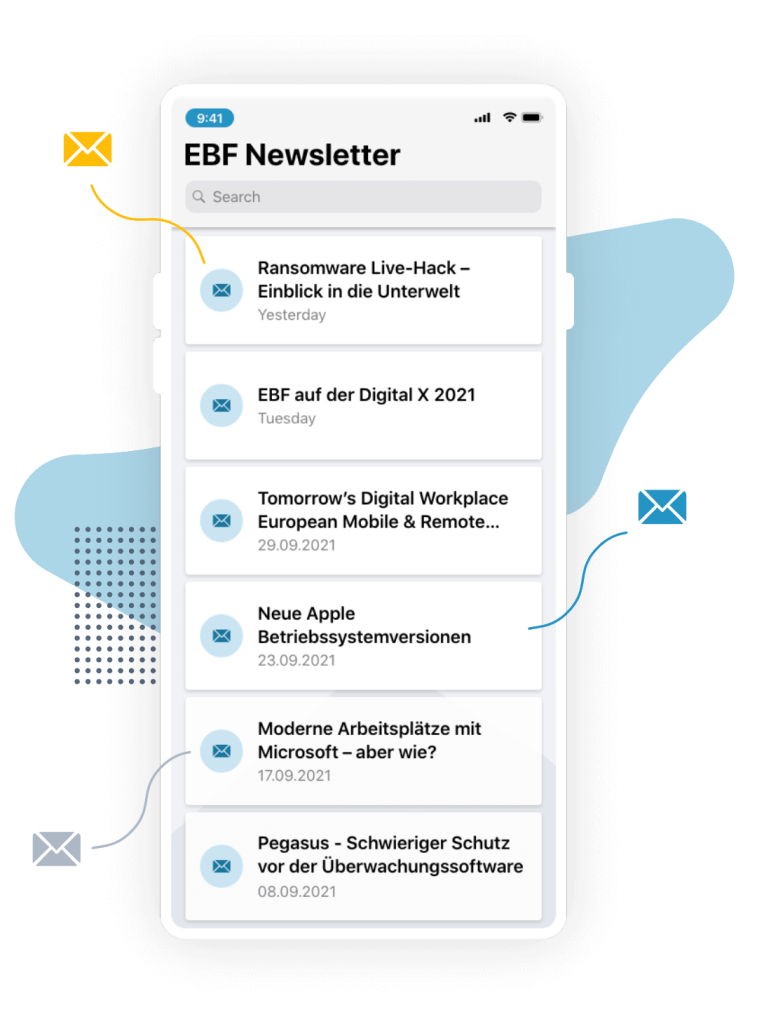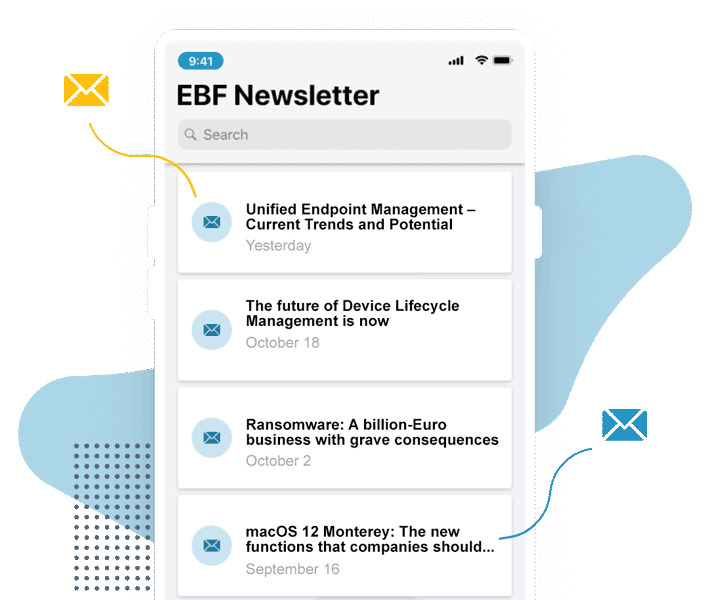2021 was the year of the home office – and of cyberattacks What will happen in 2022? As the year begins, we venture to predict the trends and topics for the coming months in the EBF blog. We explain the connections between them, show you the topics that will be important for IT teams and decision-makers this year, and how you can best prepare for them.
The security situation is serious – greatest danger for companies
Tense to critical – that is how the German Federal Office for Information Security (BSI) evaluates the current situation for companies in the Report on the State of IT Security 2021. This is due to criminals’ use of new malware and ingenious methods of attack, as well as vulnerabilities in programs and software that can be exploited by those criminals. According to theRisk Barometer 2022 survey conducted by Allianz, 44% of managers questioned regarded cybercriminality as the greatest threat for their companies – ahead of pandemics, natural disasters or operational interruptions. Ransomware, phishing, human error, and social engineering are the most common dangers.
Therefore, companies need to place a high priority on investing in the security of their data in 2022. Providing training and increasing employee awareness are just as essential to this as the use of technologies that apply AI and automation to recognize attacks before they take effect. It is also important to prepare for an emergency situation – just in case an attack is successful. This includes preparing crisis and emergency plans, and creating offline backups. For example, specific solutions can also help with direct identification of a ransomware attack, and to stop it and sound the alarm.

We therefore recommend that you keep an eye on prevention as well as containment, and to prepare an integrated response to security risks. We will soon be able to provide you with some exciting news about this. Our free newsletter always keeps you up to date.
Connect employee experience with security
The steady increase in incidence rates and the general desire for more flexibility mean that many employees will continue to work from home or from other locations in 2022. However, not everything is going well in that respect: Faltering online meetings, complicated authentication procedures, a lack of options for communicating with contacts, or an inability to access important documents are just a few examples. All in all, these apparently minor details have a significant influence on the success of modern working models. Essentially, user-friendliness is crucial for employee productivity and satisfaction – and also has an effect on the number of support queries.
That is why it will be important for companies to remove the things that obstruct mobile working and increase investment in the employee experiencein 2022. According to our 2021 European Study “Tomorrow’s Digital Workplace”, this is what many businesses failed to do last year: User-friendliness was only a priority for 22% of the companies surveyed. Security was important for many IT teams when creating remote working capacity. Now is the time to connect these aspects. And modern technologies now make it simple to realize. Functions such as conditional access are a good example of how this can be accomplished.

In our webcast, we introduce you to some of our solutions that make the difference and ensure a truly successful digital workplace. Here Watch it on-demand .
From homeoffice to the hybrid workplace – and this time, it’s even better
Rather than focusing on the home office, in the future we will be applying hybrid working models that allow employees the flexibility to choose where they work: in the office, at home, on the train or from the international remote office.
However, collaboration still needs to function when colleagues are sitting in various locations. And that requires cultural and technological changes to be made. The new working models also contain new challenges and scenarios for IT. Essentially, the work steps and processes must work regardless of where and when they are executed. IT support must be able to support employees remotely, while administering and managing an increasing number of mobile devices. Onboarding and offboarding for colleagues or launch processes for devices must also function without any in-person contact. Central administration and enrollment solutions can assist with this.

We recommend that companies define personas and scenarios to describe the various working models, and to analyze their requirements. The implemented solutions and existing processes can then be checked on this basis, and optimization can be carried out as required. The functional scope of purchased solutions is often not used to its fullest extent. However, it can frequently make sense to introduce solutions for “new” scenarios.
Innovations with software and hardware updates
Annual updates for Google and Apple operating systems will once again entail new functions for the daily work routine, but will also involve changes to administration. The Apple WWDC developers conference in June and the Google IO, which normally takes place in May, will determine the direction of travel.
However, companies will continue to focus on an update from last year: The Windows 11 operating system, which was released in October 2021, has hardware requirements that many devices can no longer meet – at least four gigabytes of memory, for example. This means that Windows 11 will make changing or upgrading hardware a necessity, and that is why many companies have not yet begun implementation. Windows 11 will therefore trigger a need for action in 2022 and the years thereafter.
It has been announced that support for Windows 10 will only end in October 2025. However, it is important to plan ahead and derive some to-dos that will help to avoid disruptions, as well as reviewing and optimizing any costs arising.
Legally compliant implementation of cloud operations
The cloud has arrived in Germany and offers a host of advantages for companies. According to the Cloud-Monitor 2021, published by KPMG and Bitkom, 82% of the companies surveyed used cloud infrastructures in 2021. The pandemic played a key role in convincing many hesitant companies to take this step. The transition to cloud operations often took place in a very short time frame – and therefore did not always go smoothly.
The Cloud Monitor shows that only every third company was able to integrate public cloud solutions without any issues. Implementation of security and compliance requirements represented the most significant obstacles. There is still plenty to do in 2022.

Check whether you are using cloud solutions in a legally compliant manner with regard to data protection and compliance regulations.
Skills shortage meets increased digitalization
Many IT teams lack skilled staff for numerous tasks in 2022. A Bitkom labor market study counted 96,000 open IT positions in the German economy in 2021 – an increase of 12% on the previous year. The rising demand for digitalization, protection and increased flexibility in the working world will meet an intensified skills shortage in 2022. Software developers, IT administrators, IT security experts, and IT project managers are in particularly high demand.
Even if a company manages to recruit and employ skilled IT personnel, there is still the risk that they can leave the company, taking urgently needed and difficult to replace (specialist) knowledge with them.
Our study “Tomorrow’s Digital Workplace” shows that internal IT teams were already shouldering a significant burden in 2021: Increasingly complex tasks, a larger number of security risks, faster innovation cycles, and surging requirements were being met by understaffed teams. Just 15% of the companies surveyed enjoyed the support of an IT contract partner.

In 2022, companies need to analyze the areas in which they can work more closely with external experts. These can apply their know-how and experience to help with closing the knowledge gaps and compensate for resources that are missing. They provide you with support to structure digital working environments in an innovative and successful manner.

Do you require assistance to implement these topics in your company?
We are happy to advise you and provide you with the benefit of our experience.







